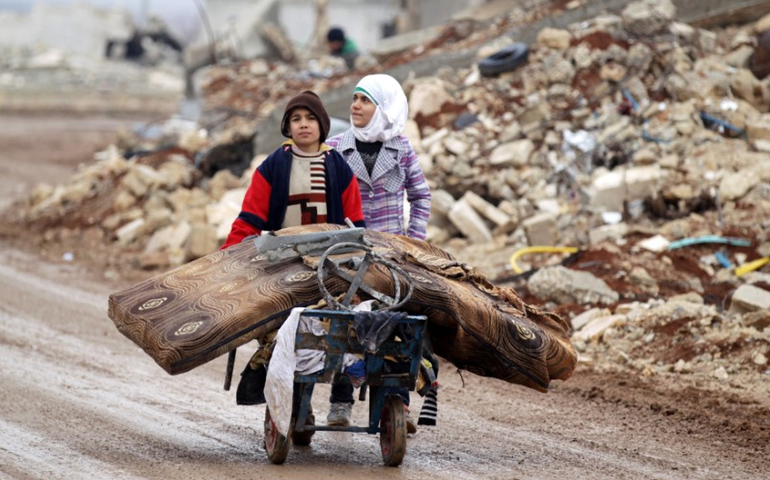
Syrian children transport their salvaged belongings from their damaged house in Doudyan, a village in northern Aleppo Jan. 2. (CNS/Khalil Ashawi, Reuters)
By now you probably know what The Handmaid's Tale is about: in the book, the United States has become the Republic of Gilead in a contemporary dystopia plagued by sterility and toxic waste. To replenish a population decimated by disease, birth control, and pollution, "Commanders" and their sterile "Wives" maintain "Handmaids" for procreation. Well-formed babies are kept. Malformed babies, called "Shredders," are not.
Margaret Atwood, who wrote The Handmaid's Tale in 1984, calls it speculative fiction. What might happen. What could happen. What probably will happen.
If truth be told, we all think about that.
So, what was Saudi King Salman thinking about when he hung a pound or so of gold chain and medal around President Trump’s neck recently? The president received Saudi Arabia’s highest award after signing an arms deal. Even before Trump took office, the U.S. controlled half of the world arms market, with Saudi Arabia, the United Arab Emirates, Australia, Iraq and Israel its biggest customers. During the Obama administration, the U.S. approved some $200 billion in arms sales.
As Donald Trump received the same award the Saudis gave Barack Obama, George W. Bush, and Vladimir Putin, a nearby television camera caught the king’s words: “Syria, too, used to be one of the most advanced countries. We used to get our professors from Syria. They served our kingdom.”
The king continued, “Unfortunately, they too brought destruction to their own country. You could destroy a country in mere seconds, but it takes a lot of effort.”
Yes, no, maybe so? I think it depends on what country you are talking about.
There are always the missiles and bombers and the rest of the bigger bang arsenal the U.S. seems so happy to sell to the guys in white hats or, in this case, keffiyehs. The theory is that the good guys will join the U.S. in going after the bad guys until whatever war is over and, assuming anything is left on the planet, everyone can get back to building, buying, and selling armaments for the next go-around.
But was the 81-year-old king making a starker statement about the United States, likening it to Syria, which “used to be one of the most advanced countries”?
Without doubt, Syria is imploding. Its president seems poised atop a pile of uninhabited rubble. Its landscape seems like the outer rings of the Republic of Gilead in The Handmaid's Tale. Its destruction is taking more than seconds, but it is happening.
Elsewhere, things move more slowly. Is it "speculative fiction" to recall the water supply nightmares in Flint, Michigan or the toxic waste dump that was Love Canal, near Buffalo, New York? How about the Three Mile Island nuclear meltdown? In the past fifty or sixty years, the U.S. has documented toxic waste disposal incidents involving coal slurry in Tennessee and Kentucky, sewage in Ohio, medical waste in Connecticut, New Jersey and New York, dioxin in Missouri, and industrial solvents in Oregon.
How far away is the United States (and many of its partners and allies) from destroying the planet? Brazil, India, Italy, Spain, and Russia have had incidents involving radioactive materials.
Between what’s in the air and what’s in the water, would anyone be surprised if fertility continued to drop in these countries? The U.S. Centers for Disease Control and Prevention posted 2016 figures showing U.S. fertility rates at their lowest since 1909, when statistics began to be recorded. All things being equal, the statisticians say there will still be population growth. At least that’s what they say.
But the dystopian future predicted in The Handmaid's Tale may already be upon us, as more and more people turn to in vitro fertilization and/or surrogacy to create new life. They may have to, but why?
Yes, King Salman, we could “destroy a country in mere seconds, but” as you say “it takes a lot of effort.” In the United States, we have all these pesky laws about how the Congress needs to authorize this and that, and then there are the budget negotiations to buy more stuff to blow things up with.
It takes less effort to just go with the flow, toxic or otherwise, to destroy a country. Somehow we do not realize we are destroying ourselves.
[Phyllis Zagano is senior research associate-in-residence at Hofstra University in Hempstead, N.Y. Her books include Women Deacons: Past, Present, Future and Women Deacons? Essays with Answers.]
Editor's note: We can send you an email alert every time Phyllis Zagano's column, Just Catholic, is posted. Go to this page and follow directions: Email alert sign-up.



